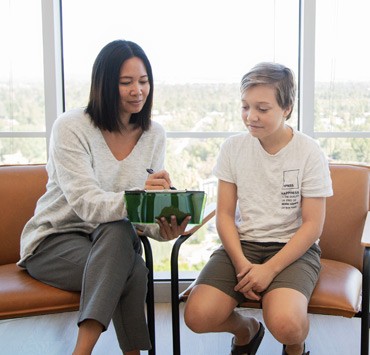Teen Counseling
Teenagers go through an enormous amount of change as they develop.
And these days, you can pair social, mental, and physical development with additional challenges, like the stress of getting into the right college. Teens may also encounter social pressures and external stressors, and they may end up spending less time with family, due to extracurricular activity, schoolwork, and other activities. Any and all of these factors can stack up, leaving teens feeling overwhelmed, depressed, confused, et cetera.
Teens may also have any number of unique circumstances that have an impact on this critical stage of life. Teens may be dealing with trauma, they may be exposed to drugs and alcohol, or they may have ADHD or behavior difficulties, among other individual circumstances. In short, adolescents and young adults face huge obstacles while adapting to huge changes.
Counseling is designed to give teens an outlet to vent, while providing them with a safe, comfortable space where they can identify their unique issues, address them, and cope with or overcome these obstacles.
Here at Whole Child Neuro, we aim to provide teens with a platform to speak openly about their problems and experiences; we provide an environment of trust; and we strive to provide teens with the tools they need to thrive throughout these crucial years.
If you’re interested in teen counseling, please don’t hesitate to reach out to us to schedule a consultation. We’d be happy to meet with you and your teen to answer any questions you may have and to understand your child’s unique situation. Feel free to continue reading to learn about teen counseling, our practice, and more.

What Is Teen Counseling?
Teen counseling usually involves one-on-one sessions with a therapist. Family members may be asked to attend group sessions in certain situations. In early sessions, the therapist will simply get to know the teen, establishing trust, rapport, and an open dialog. The therapist will guide each session, but sessions may be loosely guided and conversational, providing the teen with a platform to speak about what’s on their mind. Often, teens uncover lessons, skills, and useful tools themselves throughout their counseling sessions.
In a given session, the therapist may help unveil underlying obstacles in an individual’s life; the therapist may serve as a trusted person to vent about personal or private issues; the therapist may help to identity and bolster strengths that an individual has; and the therapist can also help to create a roadmap to achieve goals that the individual aims to meet. Again, counseling is specifically tailored to each individual, and every session will vary.
Our Practice and Techniques
Most often, the therapist will meet with your teen one on one for counseling sessions. These sessions are private, ensuring that the teen can form a trusting relationship with their therapist. Counseling sessions will be tailored to each individual’s personal history, current life, and goals.
The therapist may employ any number of techniques to help teens throughout their therapy sessions, for example, cognitive behavioral therapy. The therapist may encourage family sessions or group sessions, in as a part of a teen’s counseling program, depending on the circumstances.

Who Can Benefit From Teen Counseling?
Counseling may be beneficial for teens with all sorts of backgrounds. We work with teens who are navigating through any of the following issues, among others:
- Social difficulties, e.g. trouble making and keeping friends
- Learning disabilities, mental disabilities, or emotional difficulties
- School performance and preparing for college
- Behavior difficulties
- Explosive, angry outbursts
- Worry or anxiety
- Irritability or depression
- Perfectionism
- Low self-esteem and confidence
- Divorce, separation, and other big transitions
- Trauma
- Addiction to drugs or alcohol
- Gifted or twice-exceptional traits
- AD/HD
- Autism
Preparing Your Teen for Counseling
We recommend that parents approach teen counseling with care, especially since teens may be resistant to try counseling at first. It may be best to talk with your teen about this option and the benefits of counseling, and then let them make the decision to try counseling, supporting their choice along the way. It may also be beneficial to treat your teen as an equal, and work with them to schedule appointments around their schedule. Giving your teen choice and control of their counseling can help to form trust and to make the therapy itself more helpful. If you’d like further advice on preparing your teen for counseling, please don’t hesitate to reach out to us.

Our Peer Groups and Social Groups
Alongside our counseling sessions, we often recommend that teens attend our peer groups, depending on their unique circumstances. If you’re curious about our peer groups, feel free to read more — we organize peer groups for teen girls and social skills groups for boys.
Unlock Your Child’s Full Potential
Teens don’t have to navigate these trying years alone, and support can work wonders to help your child grow, adapt, and thrive during this important stage of development. If you’re considering teen counseling for your child, please get in touch with us for a consultation. We’d be happy to meet with you and your teen to learn more about their life and unique situation.
We provide counseling services for families and teens throughout the Greater Los Angeles area — including individuals in Sherman Oaks, Calabasas, and Beverly Hills — from our office here in Encino.
Child Abuse and Neglect Reporting Act
Psychotherapy sessions are subject to the Child Abuse and Neglect Reporting Act, as such, therapists are required to report instances of abuse or neglect under California Law. You can read legislature defined under the Child Abuse and Neglect Reporting Act from California Legislative Information site.
Otherwise, all information disclosed in sessions is confidential (between the therapist and the teen), aside from general information surrounding any diagnosis, referrals, or the overall progress of the teen, which may be shared with parents.
